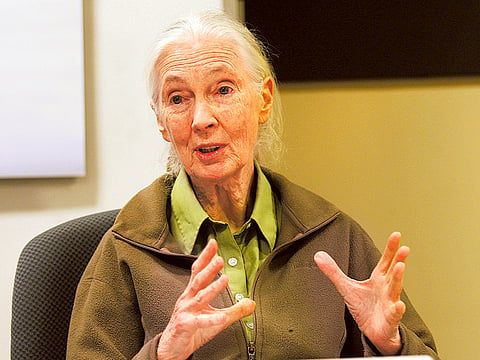Goodall lauds UAE exotic animal ban
Primatologist visits UAE to create awareness among students under her Roots and Shoots programme

Abu Dhabi: A new UAE law banning endangered wildlife from being imported into the country as pets or for trade is setting a shining example for other countries to follow, says famed primatologist and environmentalist Dr Jane Goodall.
And amid a rash of alarming reports of declining African populations of elephants, giraffes and cheetahs, Dr Goodall said the UAE’s newly enacted Federal Law No. 22 of 2016 could not have arrived at a better time.
“With the UAE staying more exotic pets, I am so thrilled to see that. They need to be congratulated. If you make a statement like that to your whole population, it makes your population think twice,” she told Gulf News in an interview.
Dr Goodall made a name for herself via breakthrough scientific discoveries during her study of chimpanzees in the 1960s in Tanzania’s Gombe Stream National Park.
More than 50 years, 15 books, and eight honorary doctorate degrees later, the anthropologist, ethologist and UN Messenger of Peace lauded the UAE’s founding father’s foresight for laying the groundwork for environmental protection and continued efforts to preserve that vision.
Dr Goodall is in the UAE to visit schoolchildren and present awards for achievers under her Roots and Shoots programme which has now grown to include 70 schools across the emirates, instilling a sense of environmental appreciation at an early age.
The former colleague of famed Kenyan archaeologist Louis Leakey is also expected to deliver a public lecture at New York University Abu Dhabi on Saturday.
The Roots and Shoots programme, launched in the UAE four years ago by UK-based Jane Goodall Institute, encourages participants to take action to help the environment.
“It’s very exciting, it’s really making a difference,” Dr Goodall said, adding that in more than 140 countries, the programme has grown to include more than 150,000 groups. “It has sprouted in some of the most amazing places.”
One of the key aims is to instill a sense of stewardship in children to give hope someday for dwindling wildlife populations.
Dr Goodall said she was heartened to hear that China and the United States will work in concert to ban nearly all ivory trade by the end of 2017 in order to stem the slaughter of elephants for their tusks.
China has announced that in cooperation with the United States, both countries have committed to crush illicit elephant ivory trade in a bid to eliminate demand for ivory.
She said that other efforts, such as the recent film “Ivory Game”, nominated for an Academy Award, are shedding light on the elephants’ plight and creating awareness that critical wildlife populations need protection.
World Wildlife Fund called the China-US pledge to ban ivory trade an “historic decision”.
“China’s announcement is a game changer for elephant conservation,” said Carter Roberts, president and CEO of WWF in a recent statement.
“The large-scale trade of ivory now faces its twilight years, and the future is brighter for wild elephants. With the US also ending its domestic ivory trade earlier this year, two of the largest ivory markets have taken action that will reverberate around the world,” he said.
Sign up for the Daily Briefing
Get the latest news and updates straight to your inbox



